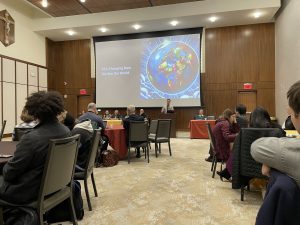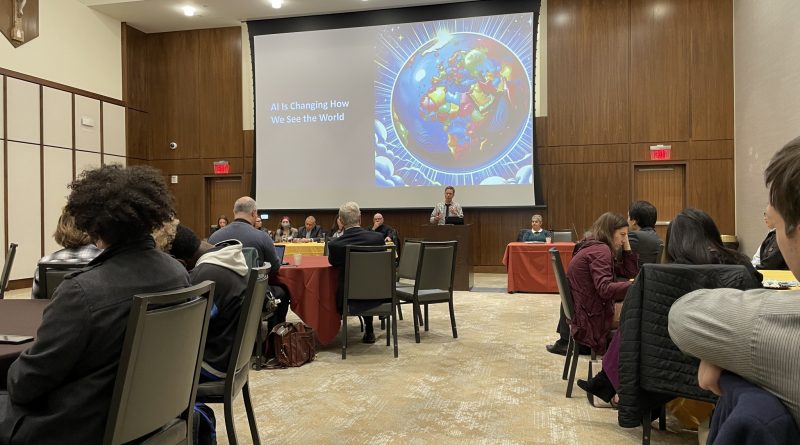Generative AI and Higher Education – The Impact that AI could have at Seton Hall
By Daniel Mahon
Stillman News Editor
On November 2nd, there was an Impact Talk hosted in Bethany Hall titled “Generative AI and Higher Education. The keynote speaker of the event was Dr. Jason Gulya, who is a professor at Berkeley College and the chair of the Artificial Intelligence council. There was also a panel of Seton Hall faculty and students to discuss the topic of AI as well, and express their beliefs on how they believe AI should or should not be implemented on campus.
Dr. Gulya started his presentation by taking a poll of the room, which found that majority of the people in the room used ChatGPT almost all the time. ChatGPT launched a little under a year ago, and is the main form of artificial intelligence that people use. You can type something into ChatGPT, and it will give you the information you need based on the subject matter you type. Dr. Gulya takes this to life by telling ChatGPT to make him a very specific podcast, and the system started to give him details, and would adjust these details when given changes. Dr. Gulya is a supporter of ChatGPT, and uses it in his classes as well. His argument is that with this innovation of artificial intelligence, we are entering a stage of hyper-personalized learning.
The rise of different AI platforms such as ChatGPT have different positive and negative qualities. AI is really changing the way that we see the world and we are evolving as a generation with it. One of the biggest negative implications of AI is that students can so easily use platforms to cheat on their papers or exams. It is up to professors and even students to have good ethics and teach the proper ways to use AI. That is what Dr. Gulya does; he imports the usage of AI into his classes and is very transparent with his students on the positives and negatives of it, as well as teaching when to dial it back. One of the experiments he did was have his students interact with ChatGPT to learn how to make counterarguments. He was able to see how they interacted with the site and teach off of that.
Dr. Gulya speaks about what AI means for the classroom. Educators now have to decide how to implement AI in their curriculum, whether to include it at all and the extent to which they do. Educators also should be educated on AI along with the students. AI also has a chance to completely replace certain jobs. AI has the ability to personalize a classroom with hundreds or thousands of people that might not be possible for human professors. It will be interesting to see in a few years if there will be fully AI schools. AI is also very easily accessible for all and could make learning so much easier for students.

There was a panel of Seton Hall members that spoke after Gulya’s presentation, just giving some of their general thoughts on AI and what it could mean for our university. The lone student on the panel was Madeline Field, a senior who is the Vice President of the Student Government Association, as well as a double major in Diplomacy and Economics with a minor in Arabic. Field’s concern with AI was that she had worries that the university would jump straight into heavy AI usage without taking the negatives into consideration. The negatives of AI could outweigh the positives in certain cases, and Field hopes that any advancements made with AI will come along with vigorous teaching and education. It is important to be cautious with it.
Professors had their own opinions on AI as well. Dr. Kirsten Schultz, who is in the history department, is concerned that AI can deskill our students and stifle the development of creativity. As of now, she prohibits the use of AI in her classes, as she believes it could be used as a shortcut instead of a way to truly learn a subject. Dr. Jess Rauchberg, who is an assistant professor of communication technologies, believes that there are ideological biases on AI, and that we should not immediately label things as red flags. She is going to demo AI tools in her upcoming classes, as she believes AI literacy is something that can enhance job opportunities. Rachael Warmington, who teaches in the English department, recognizes both the positive and negative implications of AI, and wants students and faculty to be taught about AI. She incorporates different JSTOR AI tools in her classes, and allows students to use ChatGPT, but instructs them to cite the ways in which they use the cite, incorporating good ethics. She realizes the negatives of AI as well, such as paid versions of AI working more efficiently than free version, depersonalization due to overreliance, and the lack of human interaction. She does not want AI to lessen the student’s voice.

Artificial intelligence is growing quicker than ever, and we have really never seen anything like it. This is why it is important to become educated on it, so that as it advances, we are able to catch up and use it in the correct manner. This presentation provided great information about AI, as Dr. Gulya is very knowledgeable on the topic at hand and was able to present how it can be used in the classroom. The panel was also able to share their opinions and give thoughts as to what Seton Hall can do with AI going forward. The discussion gave the audience many things to think about.
Contact Daniel at daniel.mahon@student.shu.edu

